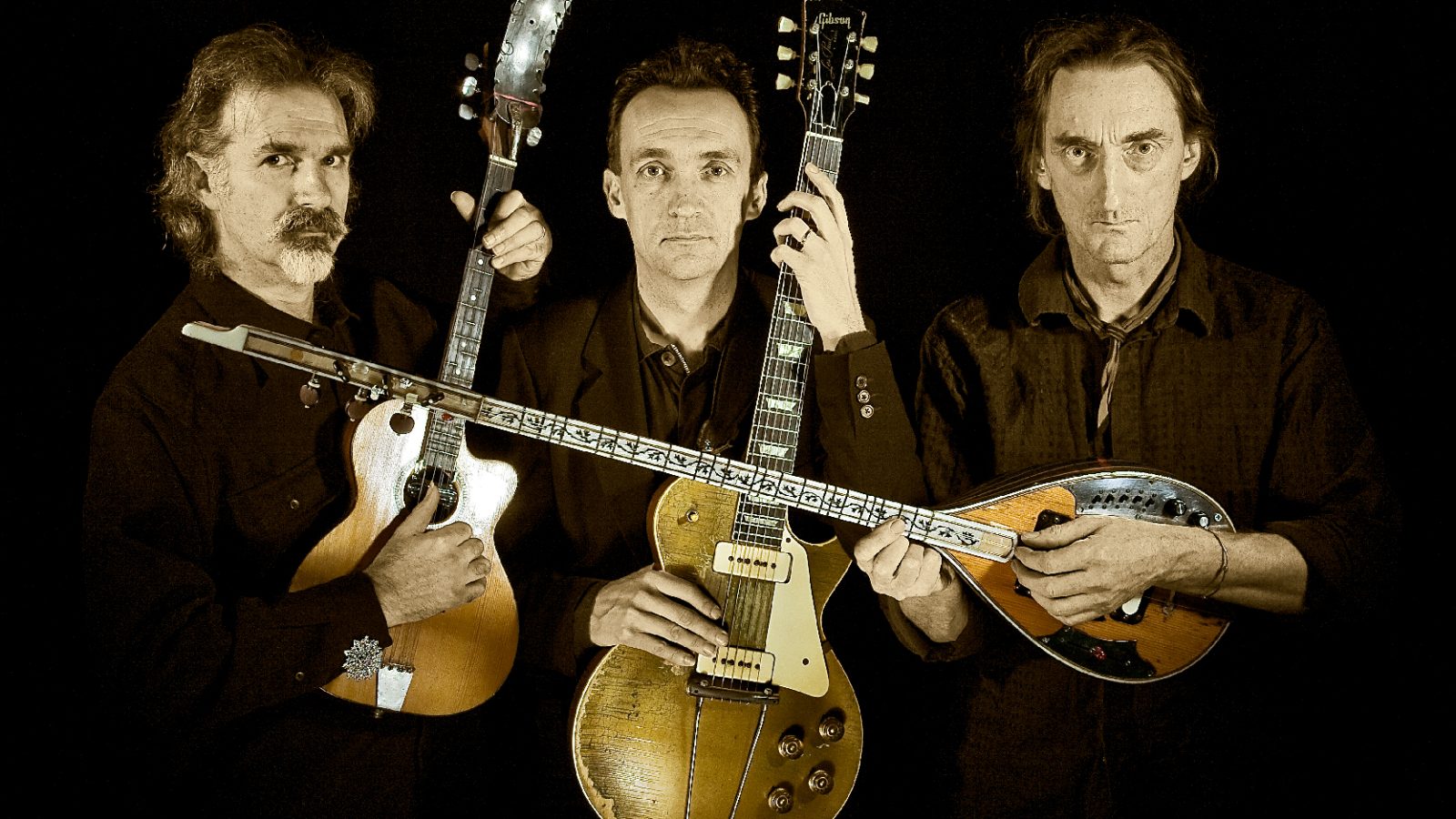Les Triaboliques are unique amongst string bands – their array of instrumentation and appreciation for international languages and cultures giving their music many distinctive qualities. The trio consists of Lu Edmonds, best known as a longstanding member of Public Image Ltd., Justin Adams, a blues guitarist who has worked with Robert Plant, and Ben Mandelson, a former member of Magazine whose many instruments include talinka, ‘a hungarain/ukainian/transsylbanian overtone flute’ and laouto (we’ll get onto those in this interview.) Having made their debut record in 2009, the band are back doing what they do best, and secured a glowing five star live review from the Guardian earlier this year. They come to Band on the Wall on 6th December and ahead of the show, kindly answered our questions about their rare instruments, plans for another album and thoughts on independence in today’s music industry.
You’re each well travelled and have worked with artists around the world. What locations and experiences have most greatly impacted the work you do as Les Triaboliques?
Ben Mandelson: ‘Our first Triaboliques standalone concert was at the Sayan Ring Festival, in Siberia (true!) So it’s been greatly international from the get-go. I wouldn’t be sure if there was one specific ‘impact’ experience, but the lessons for me over the years from all of those encounters and experiences would be the value of strength of performance, sense of place and context, and the shared experience of ‘being in it.’ And for me, playing with Lu and Justin has had as much impact on me as anything.’
Justin Adams: ‘Big impacts for me have been time spent in America, in the Middle East, Mediterranean and North Africa, and my time in London where I experienced a multi-cultural post punk explosion of vivid expression in the 80s and 90s.’
Lu Edmonds: ‘As above, being in a place and time with people always impacts way over YouTube and records, much that these also find a way into the playing, and above all Les Triaboliques.’
Almost a decade has elapsed since the release of your tremendous debut, Rivermudtwilight. Have the group written and/or recorded again since that time and looking back, how do you feel about the debut record, have the songs evolved since they were recorded?
Ben Mandelson: ‘Thanks – we are definitely writing and adding new pieces to the repertoire and to the shows. We did take ‘research leave’ for five years! Back now in 2018 and definitely playing with the benefit of that research! Yes, we must make another record.’
Lu Edmonds: ‘It is time. All the songs have become much more untamed and they are keen to find new friends in the shape of new songs.’
Ben, yourself and Lu play instruments we’re less accustomed to seeing on stages in the UK, such as the tilinko and cümbüs. Please can you tell us a little about your lesser-known instruments: where and when you first encountered them and what their unique properties are?
Ben Mandelson: ‘It’s only a matter of time until the tilinko floods the UK stages, and the cümbüs wave is building up, too. I guess that we are part of the early warning system. To be honest, the three of us have been working with many other musicians (locally & globally), and also as producers, so it’s inevitable that we would try to learn other instruments – not saying that we are ‘masters’, but we’re certainly students, and have curious minds. Non-traditional ‘band’ instruments are much more in evidence these days; you can even study them at college and University! I did a lot of field-recording in earlier life, and a lot of junk-shop combing, ears always open for other instruments. Both Lu and I have also commissioned new (or new variant) instruments, such as the baritone bouzouki (tuned in cello range), and the ‘tar-bush’ (a cross between a caucasian tar and a cümbüs). The tilinko, by the way, is a hungarain/ukainian/transsylbanian overtone flute – very nice – and the cümbüs is a 20th century-created turkish ud with a metal banjo body and skin.’
Lu Edmonds: ‘Most of the lesser-known instruments I play follow me home, like stray dogs with their big eyes and I have to feed them with time and patience and slowly we find noises together that maybe push at the aural borders. But Justin does all that on a guitar!’
Robert Plant — a fan of the group that has worked with Justin in the Sensational Space Shifters — made a surprise visit to Band on the Wall in 2015, leaving a great impression upon everyone who spoke to him. What was it like, Justin, to work with Robert and what are the benefits of having someone of his renown following the group? Has he introduced others to your music?
Justin Adams: ‘I don’t know if I can count Robert Plant as a specific Triabs fan, but he is generally a massive fan of good music, and being around him, as I have on and off for 18 years, is a continuing inspiration and education. His open and fearless approach to music has helped me find the best parts of my playing.’
Lu, you speak Russian and sing lyrics written by Gleb Gorbovsky in one of the group’s compositions. At what age did you learn the language, discover Gorbovsky’s work and what was it about his writing that resonated with you?
Lu Edmonds: ‘Songs are songs and can grab a person if the person wants to be grabbed. I grew up in the punk thing and always thought this was a progressive, not a retrograde/conservative music and thus have tried to remain open to any singing from wherever. I like this song by Gleb (which Les Triaboliques re-structured so well that Ukranian pop bands are now copying our version!) I grew up in lots of places so am semi-British (like all Triaboliques to some extent) and the CCCP [Soviet Union] was one of those places. Siberia is part of the Evil Empire and it is important that all the good God-fearing people are exposed to its underground realities.’
Artists working independently, financing their own projects and taking ownership over their own tours, is becoming increasingly common. Having worked independently and been self-sufficient in other projects, such as with PiL, what are your thoughts on the pros and cons of independence? Does it make recording and touring more pressurised, or is it liberating to be controlling these things yourself?
Ben Mandelson: ‘There’s definitely a wake-up trend for artists to learn to consider themselves to be commodifiers (active), rather than commodities (passive.) The tools for doing this are much more readily available. I’d have to ask ‘independent from what?’ I don’t know about freedom from pressure and enhanced access to liberty in this particular slice of the market – it’s just a matter of proportion and market forces! You also have to factor-in creativity, talent, desire and vision. But it’s true that ‘being independent’ is now seen as a mainstream option rather than the default position generated by a failure to be bought by the mainstream industry. The industry in general is actually quite happy that many artists are working independently (ie, investing in and funding their careers themselves – and bringing finished products to the remaining record companies, whilst maintaining an active talent pool!).
Also, we may be independent, but I think that we’re cooperative, and have supporting networks, and support others – so we’re independent, but not alone.’
Lu Edmonds: ‘Seconding Ben there and we are in fact all extremely dependent – on each other and on the goodwill and generosity of our many friends and especially whoever comes to see us, the Dear Listeners who make it possible for such a bio-diversity of sound and experimentation in the UK (and beyond) this is the Golden Great we all grew up in from Interscope onwards all the labels and festivals that knit together to make the impossible less improbable.’
If you were to introduce listeners to one rare, perhaps under-appreciated, style of music from around the world, what would you choose to play them?
Ben Mandelson: ‘Ogene music from Nigeria, kaba music from Albania, Epirot music from Epirus, Greece, Geomungo sanjo music from Korea. English Folk Music – the final frontier!’
Justin Adams: ‘That’s already lots to discover, and Ben is a great guide – but I will add that Paul Bowles’ Music of Morocco box set on Dust-to-Digital is an entrance to an amazing world of music .’
Lu Edmonds: ‘Thanks Justin & Ben, that’s all my Christmas presents sorted! I currently like the Original Sound of Cumbia & Porro which is a double CD spanning 1948-79 (label Soundway.) Great driving music and it keeps the kids quiet. Also anything by Globestyle records and Ace Records (thanks Ben & Roger for your decades at the pitface of global and local Sonics.)’



